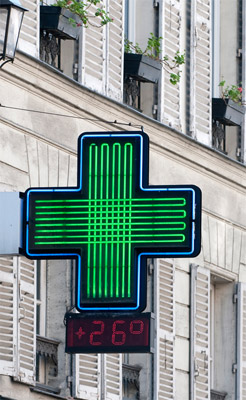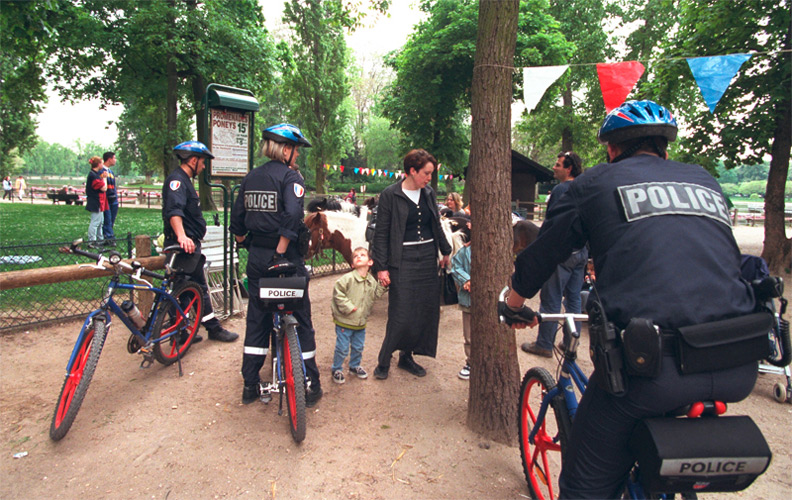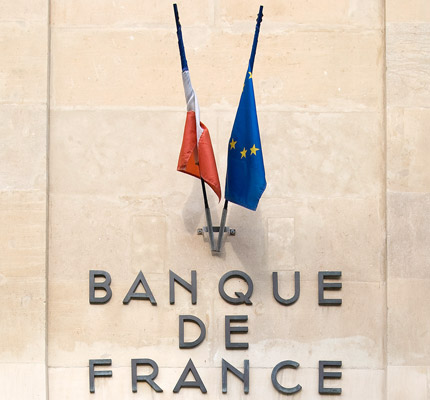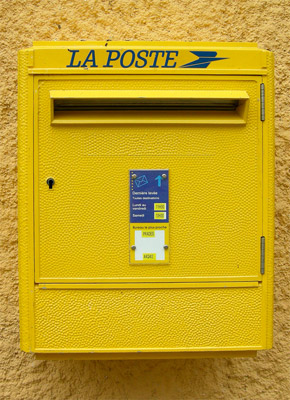< Introducing Central France and the Alps
Useful Information

The distinctive green neon sign of a pharmacy
With a little bit of planning, a family trip to France can be a very comfortable experience. Make sure passports and insurance policies are up-to-date, and photocopy them. Consider the best options for carrying and changing money; travel currency cards are a good bet. While the country is mostly safe, apply the usual precautions. Health and emergency services are excellent, and tourist offices in every town provide comprehensive information.
Passports and visas
There are no visa restrictions for EU nationals visiting France, and there are no limits on the length of the trip either, but passports or national ID cards still have to be carried. Those with Canadian, US, Australian and New Zealand citizenship also do not need visas if they plan to stay for less than three months; their passports must be valid till three months after the end of their trip. A visa will be required for stays longer than three months. Visitors from other countries need a tourist visa, and can apply for it at their local French consulate.
Australian Embassy
0140593300; www.france.embassy.gov.au/pari/home.html
Australian Consular Emergency Service
0061262613305
British Embassy
0144513100; www.ukinfrance.fco.gov.uk
UK Citizens 24-hour Consular Assistance
00442070081500
Irish Embassy
0144176700; www.embassyofireland.fr
New Zealand Embassy
0145014343; www.nzembassy.com/france
US Embassy
0143122222; http://france.usembassy.gov/
American Citizens Services Crisis Management
1-888-407-4747
Insurance
It is absolutely essential to get travel insurance, and especially when travelling with family. A good one will top up medical expenses, and insure against cancellations or lost property. Before purchasing a policy, however, make sure you are not already covered by your bank account or credit card.
European citizens are eligible for the same healthcare as the French if they possess a European Health Insurance Card (EHIC). This covers 70 per cent of the costs of visits to doctors and dentists, 80 per cent of hospital costs, and from 15 to 100 per cent of prescription drug costs. Although treatment fees have to be paid for at the time, they can be reclaimed later from the local Caisse Primaire d‘Assurance Maladie (CPAM) office. A refund confirmation will be sent to your home address. EHIC cards can easily be obtained online; every member of the family should have their own.
People from other countries must check their insurance policies to see if they are properly covered.
EHIC
www.ehic.org.uk
Health
There is a hospital in every major town and city. Head to the urgences in the nearest hospital if faced with an emergency; call SAMU (Service d’Aide Médicale Urgence) for an ambulance, or Sapeurs Pompiers (the fire brigade), who are generally faster, and trained in first aid. This is especially relevant in rural areas, as the fire station is usually closer than the nearest hospital. Most doctors speak at least a little English.
Pharmacies can be recognized by the green neon crosses outside their windows. They are open Monday to Saturday 8:30am–7:30pm, and often on Sunday mornings as well. Many close for lunch, although in shopping centres and large towns, they stay open all day. At least one area pharmacy always remains open when others close; check for details of the nearest in pharmacy windows or call 32 37. While no vaccinations are needed to enter France, bring any prescriptions and medications required by family members.
Summer can be very hot, so carry hats, water, and sunblock. In July and August, harvest mites (aoûtats) can be a real nuisance in rural areas. If bitten, wash the area with soap and warm water; ask at the pharmacy for Aspivenin, Ascabiol or Tiq’Aouta to relieve the itch. For other insect bites and stings, apply mosquito cream (crème apaisante après-moustiques). When walking in forests, beware of ticks; on finding one, use fine-tipped tweezers to pull it out gently, without rotating it. Grip the head and not the body, then disinfect.
Babysitting
Except in expensive hotels, some resorts and camp sites aimed at families, babysitting services (garde enfant) can be hard to find in France, especially if you need an English-speaking sitter at a short notice. Contact your hotel or the tourist office, in advance, to arrange for one.
Personal safety
France is a safe country for visitors, but it is advisable to follow the same precautions as you would at home. Be careful when carrying valuables such as phones, cameras, and wallets; and avoid isolated areas and major city suburban areas after dark.
Victims of a crime should report it at the nearest police station (gendarmerie). Jot down the numbers of credit cards, and keep photocopies of all passports in case they are lost and stolen. Misplaced or lost property may turn up at the local town hall (mairie); check there first. French law requires adults to carry an ID at all times. Police are allowed to stop anyone without any specific reason and ask to see it.
In an emergency, make sure you can give an address before calling the police. You will have to make a statement called a
procès verbal. Do take a certified copy of this for insurance purposes. For what to do in case of a car accident, see
'By car'.

Police on bicycles at a pony-riding event for children in a French park
All Services
112
Police
17
SAMU (ambulance) 15
Sapeurs Pompiers (fire brigade) 18
Money
Like many European nations, France also uses the euro (€); each euro is divided into 100 centimes or cents.
Most banks are open Monday to Friday or Tuesday to Saturday 8:30am–noon and 1:30–4:30pm. Many will not exchange bank notes, so obtain cash from an ATM (Distributeur Automatique de Billets), or exchange money at a bureau de change in Paris or another major city. The only other option may be to try the exchange at the central post office of a major city. Visitors are allowed to bring up to €10,000 in cash into France.
ATMs are widespread in airports, train stations, cities, nearly all towns and supermarkets. MasterCard and Visa are the most widely accepted cards; American Express and Diners Club can incur extra charges. French credit and debit cards are smart cards with a microchip (puce), which requires that you enter a PIN for each transaction. Cards that do not have a chip can be used in French ATMs, and in hotels, shops and other businesses where someone can swipe the magnetic strip. However, they cannot be used at automated petrol stations, autoroute toll booths and train-station ticket machines. An alternative is to have a travel currency card (also known as a cash passport), which you charge up in advance with a set amount of currency from your bank account at home. It can then be used at ATMs, hotels and shops like an ordinary card. Many international companies sell currency cards.
Be sure to report lost or stolen cards immediately, so that they can be blocked by the bank. Inform the police as well. Bring at least two cards and keep one in a safe place.

Sign of the Banque de France, France’s central bank
Currency cards
Travelex
www.travelex.com
Travel Currency Cards
www.cashpassport.com
Lost or stolen cards
American Express
0019054740870 for outside US 336-393-1111
Diner’s Club
0820820143
MasterCard
0800901387
VISA
0800901179
Communication
Mobile phone coverage improves every year, but there is a possibility of hitting a black spot in very rural areas, the mountains or in gorges. European phones work normally in France; US tri-band cellphones with GSM will also work. Since roaming charges can be high, check the rates with your own service provider before using the phone. If you have a smart phone, make sure automatic data roaming is turned off, so that you only connect to the Internet when you want to. Be sure to keep an eye on older kids with their own phones! If expecting to make frequent calls while visiting France, it is worthwhile carrying an unlocked phone. It can then accept a SIM card from one of the country’s three main providers – Orange, Bouygues or SFR. Any of these cards can easily be purchased online before leaving for France; a French mobile number, starting with 06, will be provided for use. Another option is to pick up a pre-paid SIM card on arrival.
As most French people now have mobiles, public telephones are not very common. However, they can still be found at airports and in train stations. Most accept phonecards (télécartes), available at newsstands, tobacconists (tabacs) and the post office; many also take credit cards. It is getting increasingly rare to find a telephone booth that accepts coins. A push button on the phones offers instructions in English. Internet access is widely available, mainly in cafés in larger towns; most offer free Wi-Fi. Many hotels and B&Bs provide free Wi-Fi access too; most cottage rentals (gîtes), on the other hand, still do not provide any. Camp sites may have a Wi-Fi zone or computer access that guests can use near the reception. Using a video call service such as Skype is, by far, the cheapest way to phone home.
There is a wide variety of British and international English-language newspapers and magazines on offer at newsstands; they may be a day late in some of the more remote districts. Many hotels and gîtes are equipped with satellite TV that will pick up CNN, EuroNews, and the BBC. Kids may find it amusing to watch their favourite cartoons dubbed in French.

A bright yellow French post box
Dialling codes
To call a French number from abroad, omit the first 0. The prefix when calling from the UK is 00 33; from the US 011 33; from Australia, Ireland and New Zealand 00 11 33
To call out of France, dial 00 and then the country code: UK 44: Canada and US 1; Australia 61; Ireland 353; New Zealand 64
Directory Inquiries in France
118218; or www.pagesjaunes.fr
Opening hours
Generally, shops in France are open 9am–7pm, closing for 2–3 hours for lunch. In big cities, however, shops and many supermarkets stay open without a break. In many parts of the country, shops are open on Sunday mornings, but are usually shut on Monday. The timings for major museums and sights may vary, and should be checked before visiting. They are mostly open 9am–5pm, often during lunch too, and stay open late one evening in a week as well. Their closing days are usually Monday or Tuesday and on public holidays.
Visitor information
Every city, town and most villages have either an Office de Tourisme or a Syndicat d’Initiative that offers local information for visitors. Most such offices have websites as well. The French government’s official tourist office website, FranceGuide, is in English, and is another good place to get information.

Tourist office with a variety of travel information on display
FranceGuide
www.franceguide.com
Disabled facilities
Each year, France improves wheelchair access to holiday areas, including beaches and ski slopes. Sites such as historical châteaux and medieval villages, however, usually have limited accessibility. Most modern hotels and B&Bs have at least one room that is especially equipped for wheelchair users. Restaurants are usually on the ground floor and easily accessible, and nearly all have disabled toilets (although cafés rarely do).
Public conveniences
There are pay toilets in automatic cubicles in many town squares. Car parks and markets have public toilets too, but they may not be very clean. Airports, shopping malls, large train stations and autoroute rest areas usually have baby changing tables.
Time
France is 1 hour ahead of Greenwich Mean Time (GMT) as it uses Central European Time (CET). It goes on daylight saving time from the last Sunday in March to the last Sunday in October. Times are usually given according to the 24-hour clock.
Electricity
French electricity is run on 220 volts, so a transformer may be needed for non-European electrical equipment. Also, since the plugs have two round prongs, an adaptor will be required.
What to pack
Apart from prescription medicines, French shops will have everything visitors may have forgotten to pack. Baby monitors are handy for young ones; easy-to-carry water bottles, baby wipes and basic medical and sewing kits are essential too.
Etiquette and attitudes
The French are very polite, and it is customary, especially in rural areas, to greet everyone in a shop, café, or even public transport with a pleasant “Bonjour Messieurs/Mesdames” on entering the premises, and wishing goodbye (au revoir) when leaving. Always remember, and teach kids, to say thank you (merci). Be sure to shake hands when introduced to someone; women and children can offer air kisses (les bises).
The French are very fond of kids and greet them warmly, but expect them to be both well behaved and respectful. Since they do not put up with much nonsense or bad manners from their own offspring, they rather frown on parents who do.





